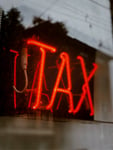No exceptions would be made, it was revealed, and ALL foreigners entering Thailand would have to pay the 300 baht to the airlines. The measure was originally intended to exclude foreigners and persons with work permits who were already residing in Thailand earlier this year. The introduction of the new “tourist tax,” a 300 baht per person arrival levy to fund required insurance coverage, was confirmed last week by the Thai government. Amounting to 11.3 percent of the charge, “limited medical insurance coverage” for foreign visitors with a cap of 500,000 baht for 30 days following their arrival was to be provided as automatic and required insurance coverage. Additionally, the government disclosed last week that an additional 88.7 percent will go to a fund to be used for “international tourism infrastructure in the country,” but it did not specify what that would entail.
Many foreigners expressed their displeasure with the new “tax” on social media, claiming that it came at the wrong moment, that work permits and long-term visa holders should be excluded, and that insurance coverage shouldn’t be required for those who already have it or local insurance plans. The 300-baht tourist levy is experiencing more instability as the upcoming general election approaches and airlines and Thai tourism players scramble to boost arrival numbers. The new tax is roughly $8.00 in US dollars.
On how the Thai government would collect the tax from land and marine arrivals, there are also delays. International airlines are now joining a lengthy list of organizations opposed to the new 300-baht arrival fee, mostly because they do not want to be in charge of its collection and because they perceive it as yet another obstacle to resuming flight schedules with the kingdom. More delays are being experienced, however, as a result of difficulties determining who would be exempt and who wouldn’t be, as well as opposition from overseas airlines charged with collecting the taxes. The gathering of passenger arrival data has also become more legally murky as a result of Thailand’s new privacy rules, which might be contested by international airlines and travelers.

More reservations about the implementation of the new Thai tourist entry tax
More from ThailandMore posts in Thailand »
- Top 20 Cannabis Shops: Where to Buy Weed in Chanthaburi Vol 1, 2024
- Top 20 Cannabis Shops: Where to Buy Weed in Phetchaburi Vol 1, 2024
- Top 20 Cannabis Shops: Where to Buy Weed in Nong Khai Vol 1, 2024
- Top 20 Cannabis Shops: Where to Buy Weed in Chumphon Vol 1, 2024
- Top 20 Cannabis Shops: Where to Buy Weed in Mae Hong Son Vol 1, 2024
- Top 20 Cannabis Shops: Where to Buy Weed in Phang-nga Vol 1, 2024
- Top 20 Cannabis Shops: Where to Buy Weed in Tak Vol 1, 2024
- Top 20 Cannabis Shops: Where to Buy Weed in Nakhon Nayok Vol 1, 2024
- Top 20 Cannabis Shops: Where to Buy Weed in Nong Bua Lam Phu Vol 1, 2024
- Top 20 Cannabis Shops: Where to Buy Weed in Pathum Thani Vol 1, 2024
- Top 20 Cannabis Shops: Where to Buy Weed in Kanchanaburi Vol 1, 2024
- Top 20 Cannabis Shops: Where to Buy Weed in Nakhon Phanom Vol 1, 2024
More from TourismMore posts in Tourism »
- Thailand is Tightening Up on Visa Runs and Long Stays on Exemption
- Thailand Digital Arrival Card (TDAC): New AGENTS Update Hotel Drop-off
- AGENTS CO., LTD. Launches Redundancy TDAC Submission Platform for Travelers and Tour Operators
- Destination Thailand Visa (DTV): The Digital Nomads Visa
- How to select a Trustworthy Visa Agency in Thailand
- 🌿 🇹🇭 Cannabis in Thailand: The Fight for Freedom Continues
- Interactive Platform Maps Out Thailand’s Thriving Cannabis Landscape
- The first Phuket Cannabis Cup – March 25th
- eSIMs – The Future of Mobile Connectivity for Traveling to Thailand
- Lunar surge may top 1.8 million traveler at airport
- Thailand will begin collecting 300 THB tourist fee in June.
- Thailand to Offer Free Covid-19 Tests and Vaccines to Visitors: Here’s How!



























Be First to Comment